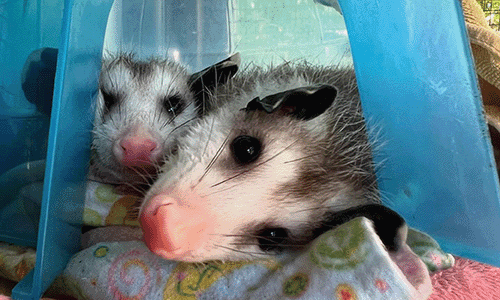By: Kara Tyler-Julian | Biologist
If you have a yard, a garage or spend any amount of time outside, chances are you have encountered our only native marsupial species, the Virginia Opossum (Didelphis virginiana). Many people may experience negative emotions when they encounter opossums, as they do have an unfortunate appearance that can elicit feelings of disgust or fear. Their open-mouth, snaggle tooth threat stance and long naked tail might remind one of the “terrifying Rats of Unusual Size” from the Princess Bride movie. However, these omnivorous scavengers are nothing to fear and something instead to value and appreciate.
As omnivores, these nocturnal scavengers will eat just about anything they can find, including fruits and vegetables, insects, carrion, pet food, and human food left in easy-to-reach outdoor garbage bins. Opossums prefer wooded areas near water but are well adapted to urban areas, especially where they can easily access food waste and pet food left outdoors. When they reproduce, they will have between 7 and 11 offspring and those baby opossums spend approximately the first 80 days inside of their mother’s pouch, where they can nurse.
While these creatures look terrifying with their defensive posture of presenting their sharp teeth with an open-mouthed snarl, they are rarely aggressive and only bite when threatened. They have a low body temperature, which inhibits the ability of the rabies virus to replicate in their body, making them unlikely to be infected with the rabies virus. Despite this fact and their impressive immune system, they have a short lifespan of only 1-2 years in the wild. Their lives may be cut even shorter by vehicle strikes and dog attacks, in addition to predation by native predators. They will take shelter in places such as hollow logs, rock piles, and gopher tortoise burrows. Interestingly, opossums have been reported to consume ticks and are also reported to be immune to snake venom. These interesting marsupials deserve our respect and protection.
In order to be a good steward of our local wildlife where opossums are concerned, remember to follow these important tips: 1. Keep your garbage contained indoors or in locked garbage cans to prevent conflict with humans. 2. Keep pet food indoors only to prevent them from relying on human activities for food. 3. Keep pets indoors to prevent conflict between opossums and pets. 4. Drive slowly at night and keep an eye out for opossums and other wildlife so you have time to stop for any crossing the road. 5. If you do see an opossum on the road that has been struck by a car, make sure to check the pouch for any babies that may be in there and still alive. If you find babies, take them to the nearest wildlife rehabilitation center so they can be raised and released. Keep in mind that these and other native animals existed in this habitat long before we did, and it is important to protect and respect them.








